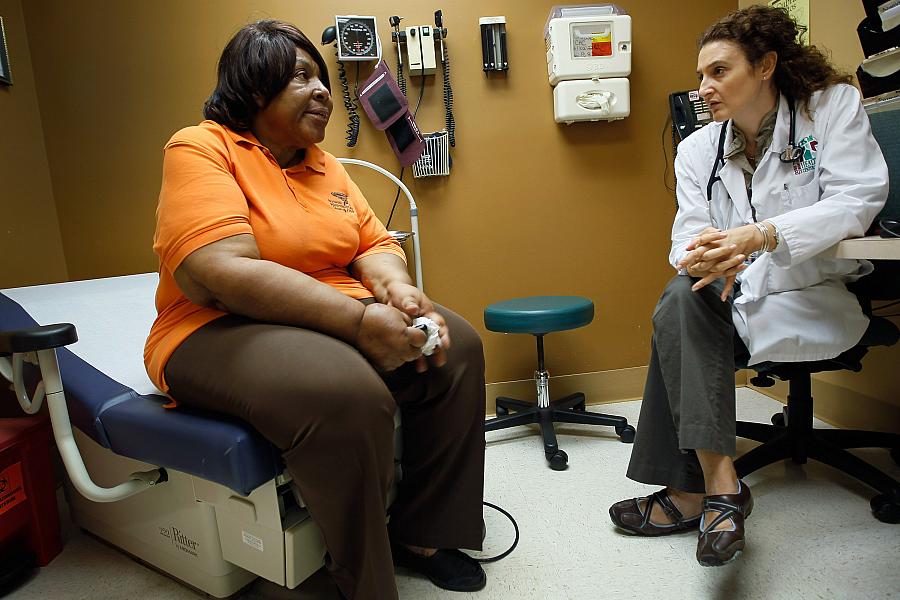In U.S., income levels too often reveal how people feel about their health and access to care

In the June issue of the journal Health Affairs, my colleagues and I published research showing that in 2012, just prior to the implementation of the Affordable Care Act, the United States had among the widest income-based disparities in people’s perceptions of their own health and health care among a global sample of 32 countries.
Compared to people in the top third, those in the bottom third of household income in the U.S. tended to rate their health worse, forgo care they felt they needed because of cost, are less satisfied with their medical care, and feel less secure about getting their health care needs met in the future. The other countries that consistently did as poorly in disparities as the U.S. along these dimensions were middle income-countries, such as Chile, Bulgaria, and the Philippines, where access to health care is often not universal.
In some cases, high U.S. disparities were driven by especially poor outcomes among low-income groups. For example, over one in five respondents in the lowest income third reported not receiving needed health care because they could not pay for it — this was the highest among all but three countries studied.
These results were partly explained by the high number of uninsured in the U.S., who have been repeatedly shown to experience high barriers to health care access and lower quality of care. Before the passage of the ACA, the U.S. Census put the number of people in the U.S. who lacked insurance at some point during the year at around 50 million, roughly 30 million of whom lived in households that earned under $50,000 a year. But insurance status did not tell the whole story. The U.S. remained one of the most unequal countries even after adjusting for insurance status.
To many readers, the poor relative performance of the U.S. in health and health care equity confirmed preexisting notions about inequities in this country. This reflects one of the most striking findings of our research: close to seven in 10 respondents in the U.S. believed that “many” people go without the health care they need, well above the rate in the next highest country.
Yet despite this widespread recognition of unmet need, a relatively low percentage of U.S. respondents compared with other countries said that they felt it was unfair that people with higher incomes receive better health care than people with lower incomes. Views on whether and how to address health care disparities is also strongly divided by political party. A recent poll of likely voters by one of my coauthors, Robert Blendon, found that 91 percent of Democrats, but only 42 percent of Republicans, agreed that it was the federal government’s responsibility to equalize access to and quality of health care between rich and poor.
This was not always the case. Just prior to the Clinton administration’s attempt at health care reform, attitudes regarding the need for federal intervention in health care appeared to be converging, with people across the political and economic spectrum expressing increased support for a federal role in health care initiatives.
The highly politicized fights over health reform that have followed appear to have raised awareness among the public of the failings of the U.S. health care system, but may have damaged bipartisan paths to address health and health care inequality.
Through increased eligibility for Medicaid and the requirement that insurers cover a set of essential health benefits, the ACA has provided the most promising foundation for tackling health care disparities since Medicare and Medicaid were created. The number of uninsured among poor childless adults was cut in half between 2013 and 2015, and data emerging from states that decided to expand their Medicaid programs shows that the newly insured feel better about their own health, their out-of-pocket costs, and are more likely to report a usual source of care. However, even with full implementation of the ACA, gaps in access to and quality of health care between public and private insurance would leave significant disparities in place.
Most arguments in favor of the bills to repeal and replace the ACA in the House and Senate pointedly do not identify reducing health or health care disparities as a goal. Based upon CBO estimates of reduced insurance coverage alone, their passage would increase disparities from where they are today and continue to widen the gap as constraints on Medicaid funding become increasingly stringent over time.
The lack of progress seen in reducing health and health care disparities in the U.S. can foster an air of inevitability about the problem. However, the experience of other high-income and some middle-income countries shows us that these disparities are solvable. Several countries in Europe appear to be making headway in closing absolute disparities in mortality among socioeconomic groups.
Raising awareness of inequality in our health care system will not be sufficient in building public support for policy interventions, and members of the health policy community will need to make stronger arguments for why reducing health and health care inequalities should be a priority. Both our research and others have found that the majority of Americans are concerned about disparities, and experiments have shown that framing health care issues in terms of inequality can sway Americans in support of public interventions. Support is often highest when health is viewed as an issue of equal opportunity, and when variations in health status are viewed in light of their social and economic determinants.
Policy makers and others who are interested in reducing income disparities in health and health care in the years ahead may achieve some success by appealing to people along these lines, in ways that avoid stark political divisions. But as our research suggests, consolidating support for solutions that fit the magnitude of the problem is a daunting challenge.
[Photo by Joe Raedle/Getty Images]

